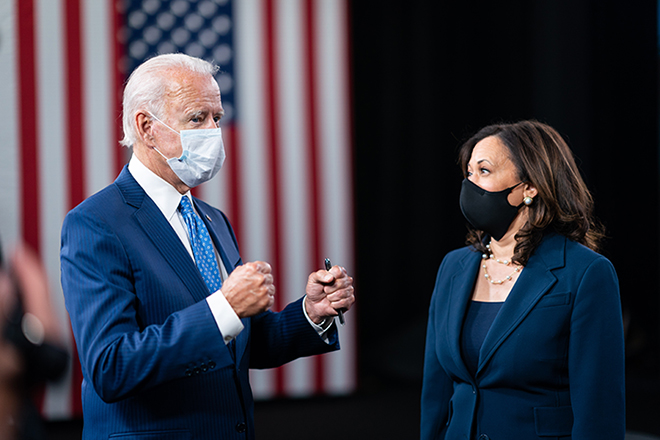S&P Global Offerings
Featured Topics
Featured Products
Events
S&P Global Offerings
Featured Topics
Featured Products
Events
S&P Global Offerings
Featured Topics
Featured Products
Events
Banking & Capital Markets
Economy & Finance
Energy Transition & Sustainability
Technology & Innovation
Podcasts & Newsletters
Banking & Capital Markets
Economy & Finance
Energy Transition & Sustainability
Technology & Innovation
Podcasts & Newsletters
S&P Global Offerings
Featured Topics
Featured Products
Events
14 Jan, 2021
By Donna Young

|
President-elect Joe Biden and Vice President-elect Kamala Harris |
President-elect Joe Biden plans to ask Congress for $400 billion to beef up the U.S. response to the COVID-19 pandemic, with $20 billion of those funds intended to help vaccinate the nation.
"It's a lot but I'm convinced we are ready to get this done," Biden said during a Jan. 14 evening speech detailing his $1.9 trillion pandemic and economic relief package. "The very health of our nation is at stake."
Biden plans to lay out more details of his plan to administer vaccines in the U.S. during a Jan. 15 address.
"The vaccine rollout in the United States has been a dismal failure thus far," Biden said, criticizing the structure he will be inheriting from the Trump administration.
As of Jan. 14, there were 30.6 million doses of Pfizer Inc. and Moderna Inc.'s COVID-19 vaccines distributed in the U.S. but only 11.1 million of those had been administered, according to the Centers for Disease Control and Prevention.
Biden, Vice President-elect Kamala Harris and their transition team have long complained that they were not getting access to the full details about the distribution system being run by the Trump administration's Operation Warp Speed — a project the incoming president is expected to rename and overhaul.
One Biden-Harris Transition official told reporters Jan. 14 the system the new administration will be taking over is "much worse than we could have imagined," adding that the Trump administration had failed to set up an infrastructure for vaccinating Americans.
From the get-go, Warp Speed put the onus on states and territories to craft their own COVID-19 vaccine administration plans. U.S. Health and Human Services Secretary Alex Azar has also been slow in releasing congressionally mandated funds to the jurisdictions to carry out their vaccination programs.
HHS has repeatedly declined to respond to questions about whether Azar would ensure any of the nearly $9 billion Congress allotted in December 2020 for COVID-19 vaccinations would be issued to states and territories before the Trump administration left office.
In November 2020, philanthropist Bill Gates said he was concerned about the "cacophonous" nature of the Trump administration's strategy for distributing COVID-19 vaccines.
"I don't see it coming together in a rational fashion," Gates said, calling the officials running Warp Speed "a dysfunctional set of people."
With only one week left in office, Azar on Jan. 12 instituted major changes to Warp Speed's COVID-19 vaccine distribution system.
The Trump administration adopted Biden's plan to release the reserve of doses being held back for second shots of the two-dose vaccines from Pfizer and Moderna.
But another change Azar made was telling states to immediately open up their vaccinations to 160 million additional Americans — people aged 65 years or older and those with comorbidities, such as asthma and diabetes — and set aside the priority framework recommended by expert advisers to the CDC.
Some public health experts raised concerns that such an approach could quickly overwhelm states' and territories' vaccination systems.
"This seems like chaos," tweeted Jason Schwartz, assistant professor of health policy and the history of medicine at Yale University School of Public Health.
"Frustration sure to ensue" when over 100 million people are told they are eligible for vaccines now, while most are likely to wait for several months to actually get the shots, Schwartz said.
Rebuilding public health
Also included in the $400 billion that Biden plans to ask Congress to allot is a $50 billion request to purchase rapid tests, expand laboratory capacity and help support schools and governments implement regular testing protocols.
|
|
Biden said he also wants to make an "historic investment" in expanding the U.S. public health workforce, adding 100,000 workers, nearly tripling the nation's community health roles.
Those individuals will be hired to work in their local communities to perform vital tasks such as vaccine outreach and contact tracing in the near term and will later transition into community health roles to build the nation's long-term public health capacity — an effort aimed at improving the quality of care and reducing hospitalization for low-income and underserved communities, the Biden-Harris Transition team said in a Jan. 14 statement.
"Last year demonstrated how a frail, poorly tended public health infrastructure can bring a great country to its knees," Rochelle Walensky, Biden's incoming CDC director, wrote in a Jan. 11 op-ed in The New York Times, where she called on Congress to provide more funding. "Public health has been diminished and underfunded for years."
Reengaging with the world
Biden's COVID-19 rescue plan also calls for restoring U.S. leadership in the global health community.
|
|
The pandemic is a "grave reminder that biological threats can pose catastrophic consequences to the United States and the world," the Biden-Harris Transition team said.
Biden's plan aims to provide support for international health and humanitarian response and back global efforts to develop and distribute medical countermeasures for COVID-19.
He has vowed to reverse President Donald Trump's decision to withdraw from the World Health Organization.
On Jan. 13, Biden revealed that he plans to nominate Samantha Power as his administrator of the U.S. Agency for International Development. Power previously served in the Obama administration as the U.S. ambassador to the United Nations.
"Our security is connected to the security of people who live elsewhere," Power said in a video posted on Twitter by the Biden-Harris Transition team. "In the 21st century, we live in an incredibly interconnected world. If people weren't persuaded of that before the COVID-19 pandemic, they certainly are now."
